Tags
1904, A Book of Songs and Poems from the Old Testament and Apocrypha, Chelsea, Cicely Hornby, Emery Walker, England, Haggadah, Jon Bingham, Jonathan Bingham, Kelmscott Press, Ken Tomkinson, Matzah, Passover, Ptolemy Typeface, Seder, St John Hornby, Subiaco Typeface, Sydney Cockerell, The Ashendene Press, William Hooper, William Morris
“Then on that day David delivered first this Psalm to thanke the Lord into the hand of Asaph and his brethren: give thankes unto the Lord, call upon his name, Make known his deeds among the people. Sing unto him, sing psalms unto him. Talke you of all his wonderous works…”
~ The Psalm of Thanksgiving of David
A Book of Songs and Poems from the Old Testament and the Apocrypha
Chelsea, England: Ashendene Press, 1904
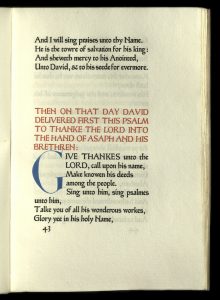 Passover is an eight day Judeo festival celebrated in the spring, from the 15th through the 22nd of the Hebrew month of Nissan (March 30th – April 7th, 2018). Commemorating the emancipation of the Israelites from slavery in ancient Egypt, Passover is observed by avoiding leaven and is highlighted by the Seder meals that include four cups of wine, eating matzah and bitter herbs, and retelling the story of the Exodus. In Hebrew it is known as Pesach (which means “to pass over”) because God passed over Jewish homes when killing the Egyptian firstborn on the very first Passover eve. Passover is divided into two parts: The first two days and last two days (the latter commemorating the splitting of the Red Sea) are full-fledged holidays on which candles are lit at night and kiddush and sumptuous holiday meals are enjoyed. Those observing the holiday don’t go to work, drive, write, or switch on or off electric devices. The middle four days are called Chol Hamoed, semi-festive “intermediate days,” when most forms of work are permitted.
Passover is an eight day Judeo festival celebrated in the spring, from the 15th through the 22nd of the Hebrew month of Nissan (March 30th – April 7th, 2018). Commemorating the emancipation of the Israelites from slavery in ancient Egypt, Passover is observed by avoiding leaven and is highlighted by the Seder meals that include four cups of wine, eating matzah and bitter herbs, and retelling the story of the Exodus. In Hebrew it is known as Pesach (which means “to pass over”) because God passed over Jewish homes when killing the Egyptian firstborn on the very first Passover eve. Passover is divided into two parts: The first two days and last two days (the latter commemorating the splitting of the Red Sea) are full-fledged holidays on which candles are lit at night and kiddush and sumptuous holiday meals are enjoyed. Those observing the holiday don’t go to work, drive, write, or switch on or off electric devices. The middle four days are called Chol Hamoed, semi-festive “intermediate days,” when most forms of work are permitted.
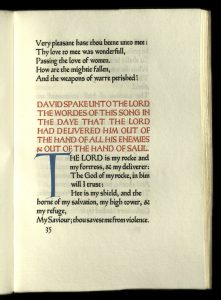 To commemorate the unleavened bread that the Israelites ate when they left Egypt, chametz (leaven, or food mixed with leaven) is not eaten (or even retained in the observant’s possession) from midday of the day before Passover until the conclusion of the holiday. Instead of chametz, matzah (flat unleavened bread) is eaten. It is a mitzvah (religious duty or commandment) to partake of matzah on the two Seder nights. The highlight of Passover is the Seder, observed on each of the first two nights of the holiday. The Seder is a fifteen-step, family-oriented and ritualistic meal. In addition to the partaking of the four cups of wine, matzah, and bitter herbs, another focal point of the Seder includes the recitation of the Haggadah, a liturgy that describes in detail the story of the Exodus from Egypt. The Haggadah is the fulfillment of the biblical obligation to recount the story of the Exodus on the night of Passover.
To commemorate the unleavened bread that the Israelites ate when they left Egypt, chametz (leaven, or food mixed with leaven) is not eaten (or even retained in the observant’s possession) from midday of the day before Passover until the conclusion of the holiday. Instead of chametz, matzah (flat unleavened bread) is eaten. It is a mitzvah (religious duty or commandment) to partake of matzah on the two Seder nights. The highlight of Passover is the Seder, observed on each of the first two nights of the holiday. The Seder is a fifteen-step, family-oriented and ritualistic meal. In addition to the partaking of the four cups of wine, matzah, and bitter herbs, another focal point of the Seder includes the recitation of the Haggadah, a liturgy that describes in detail the story of the Exodus from Egypt. The Haggadah is the fulfillment of the biblical obligation to recount the story of the Exodus on the night of Passover.
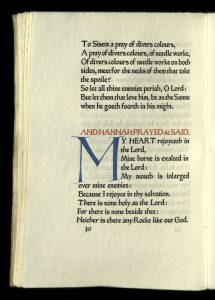 While not part of Passover observance per se, it may be nice to take a look at this beautiful collection of Old Testament songs and poems, printed by the Ashendene Press in 1904. Operated in Chelsea (an area in southwest London), England from 1895 to 1915 and then again from 1920 – 1935, the Ashendene Press was a small, private press founded by Charles Harold St. John Hornby (1867 – 1946). Naturally, St John Hornby was aided in the running of the press by his wife Cicely (daughter of Charles Barclay, a director of the National Provincial Bank, and Charlotte Cassandra Cherry) whom he married on 19 January 1898. In 1900, Hornby met Emery Walker and Sydney Cockerell (then William Morris’ secretary at the Kelmscott Press). Together, they encouraged and instructed Hornby and helped in devising two typefaces for his own use, Subiaco and Ptolemy.
While not part of Passover observance per se, it may be nice to take a look at this beautiful collection of Old Testament songs and poems, printed by the Ashendene Press in 1904. Operated in Chelsea (an area in southwest London), England from 1895 to 1915 and then again from 1920 – 1935, the Ashendene Press was a small, private press founded by Charles Harold St. John Hornby (1867 – 1946). Naturally, St John Hornby was aided in the running of the press by his wife Cicely (daughter of Charles Barclay, a director of the National Provincial Bank, and Charlotte Cassandra Cherry) whom he married on 19 January 1898. In 1900, Hornby met Emery Walker and Sydney Cockerell (then William Morris’ secretary at the Kelmscott Press). Together, they encouraged and instructed Hornby and helped in devising two typefaces for his own use, Subiaco and Ptolemy.
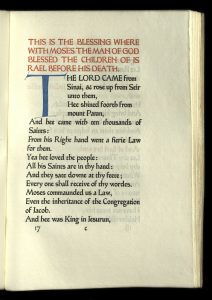 Most Ashendene editions used one of these two typefaces, which were specially cast for the Press. Subiaco was based on a fifteenth-century Italian type cast by Sweynheim and Pannartz in Subiaco, Italy. The Ptolemy typeface was originally created by the Ulm based printer Lienhart Holle in 1482 for the work Cosmographia, a cartographic work by Claudius Ptolemaeus. Hornby, Walker, and Cockerel wanted to recreate a typeface with a character equal parts Gothic and Roman (“Gotico-Antiqua”) and they re-created the Ptolemy typeface for that reason.
Most Ashendene editions used one of these two typefaces, which were specially cast for the Press. Subiaco was based on a fifteenth-century Italian type cast by Sweynheim and Pannartz in Subiaco, Italy. The Ptolemy typeface was originally created by the Ulm based printer Lienhart Holle in 1482 for the work Cosmographia, a cartographic work by Claudius Ptolemaeus. Hornby, Walker, and Cockerel wanted to recreate a typeface with a character equal parts Gothic and Roman (“Gotico-Antiqua”) and they re-created the Ptolemy typeface for that reason.
Some Ashendene books were illustrated with wood-engravings, but the majority were printed solely using type. The wood engraver William Harcourt Hooper worked for Ashendene Press starting in 1896, after working at Kelmscott Press from 1891 to that time (during which he had contributed to works such as the Kelmscott Chaucer). It is reported that Hornby called Hooper “almost the last of the old school of wood-engravers and a very fine craftsman.”
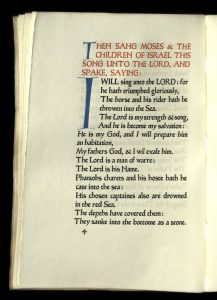 A Book of Songs and Poems from the Old Testament and the Apocrypha is a wonderfully produced, sixty-two page book printed in an edition of 175 copies (150 on paper and 25 on vellum). The text is printed in black and red, with initial capitals in blue by Graily Hewitt, on Batchelor’s “Hammer and Anvil” paper. This octavo book (19 x 13 cm or 7½ x 5¼ inches) contains eleven selections. Eight of these from the Old Testament and three from the Apocrypha, which are biblical or related writings not forming part of the accepted canon of Scripture. The Biblical Apocrypha is a set of texts included in the Latin Vulgate and Septuagint but not in the Hebrew Bible. Of the eight selections from the Old Testament, one is from Exodus, two from Deuteronomy, one from Judges, three from Samuel (one Samuel I and two Samuel II), and one from Chronicles I.
A Book of Songs and Poems from the Old Testament and the Apocrypha is a wonderfully produced, sixty-two page book printed in an edition of 175 copies (150 on paper and 25 on vellum). The text is printed in black and red, with initial capitals in blue by Graily Hewitt, on Batchelor’s “Hammer and Anvil” paper. This octavo book (19 x 13 cm or 7½ x 5¼ inches) contains eleven selections. Eight of these from the Old Testament and three from the Apocrypha, which are biblical or related writings not forming part of the accepted canon of Scripture. The Biblical Apocrypha is a set of texts included in the Latin Vulgate and Septuagint but not in the Hebrew Bible. Of the eight selections from the Old Testament, one is from Exodus, two from Deuteronomy, one from Judges, three from Samuel (one Samuel I and two Samuel II), and one from Chronicles I.
Rare Books copy contains unattached, but laid in, bookplate of “Ken Tomkinson, High Habberley House, Kidderminster Worcs [Worcestershire], England.” While we don’t 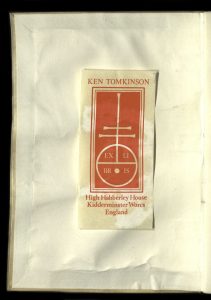 know much about Ken Tomkinson, author of Kidderminster Since 1800 (1975) and Characters of Kidderminster (1977), we can at least surmise that he possessed excellent taste in books since he owned this one.
know much about Ken Tomkinson, author of Kidderminster Since 1800 (1975) and Characters of Kidderminster (1977), we can at least surmise that he possessed excellent taste in books since he owned this one.
A Book of Songs and Poems from the Old Testament and the Apocrypha is a fantastic addition to the University of Utah’s amazing Rare Books collections – and somewhat miraculously, perhaps, it came just in time for Passover.
~ Contributed by Jon Bingham, Rare Books Curator

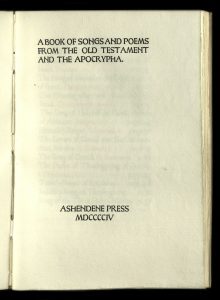
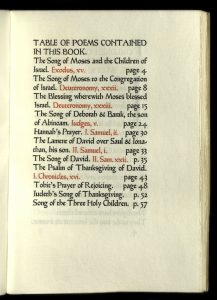
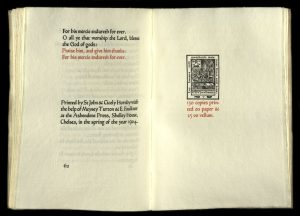
You must be logged in to post a comment.